|
|
|
Sort Order |
|
|
|
Items / Page
|
|
|
|
|
|
|
| Srl | Item |
| 1 |
ID:
178933
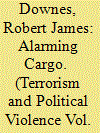

|
|
|
|
|
| Summary/Abstract |
Programme CYCLAMEN was initiated to manage the risk of non-conventional terrorism in the United Kingdom following Al-Qaeda’s attacks against the United States in 2001. Under Programme CYCLAMEN, the UK developed a border monitoring capability to detect and deter the illicit cross-border movement of radiological and nuclear materials by malicious non-state actors. This paper examines the development of border monitoring technologies before and after 9/11 with a focus on Programme CYCLAMEN using two models of state response to terrorism. Under the Control Model, state agencies seek to manage the risk associated with terrorism through disruption of terrorist activities. Under the Regulatory Model, actions are conceptualised as safeguarding public health and safety from various sources of risk including terrorism. The Regulatory Model is found to be dominant before 9/11 but the Control Model dominated thereafter and Programme CYCLAMEN is best understood as emanating from the Control Model. However, earlier action under the Regulatory Model shaped later consideration of this particular border-based protective security measure. This paper explores this shaping process and concludes that the Regulatory Model is under-considered as a model of state response to terrorism.
|
|
|
|
|
|
|
|
|
|
|
|
|
|
|
|
| 2 |
ID:
048975
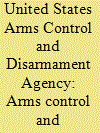

|
|
|
|
|
| Publication |
Washington, United States arms control and disarmament agency, 1996.
|
| Description |
vi, 350p.
|
| Standard Number |
0160486890
|
|
|
|
|
|
|
|
|
|
|
|
Copies: C:1/I:0,R:0,Q:0
Circulation
| Accession# | Call# | Current Location | Status | Policy | Location |
| 039727 | 341.026/ARM 039727 | Main | On Shelf | General | |
|
|
|
|
| 3 |
ID:
079942
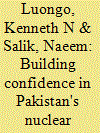

|
|
|
| 4 |
ID:
183002
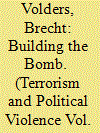

|
|
|
|
|
| Summary/Abstract |
A terrorist organization constructing and detonating a nuclear device is often a topic of popular, academic, and political concern. Yet, assessing this risk is a challenging task. This article aims to contribute to the encompassing nature of any future nuclear terrorism threat assessments by further exploring the often overlooked organizational dimension in probability assessments on nuclear terrorism. Particular emphasis is given to the role of the organizational design. In order to do so, this article theoretically builds on a 2017 research article and empirically studies Aum Shinrikyo’s chemical and biological armament activities. This article confirms and further refines the idea of an effectiveness-efficiency trade-off for a terrorist organization implementing a nuclear armament project. It particularly zooms in on the constraints that follow from the covert nature of this type of plot and elaborates on the role of Aum Shinrikyo’s value-rationality.
|
|
|
|
|
|
|
|
|
|
|
|
|
|
|
|
| 5 |
ID:
162686
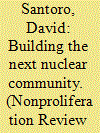

|
|
|
|
|
| Summary/Abstract |
This viewpoint takes stock of the changes in the strategic nuclear landscape in recent decades and reflects on its consequences on the policy community. It finds that the number and scope of issues have expanded considerably; they have manifested themselves in many more regions of the world; and they have become deeply politicized and polarized. The consequences have been twofold: the nuclear policy field has seen the development of an increasingly diverse expert community composed of highly specialized functionalists and regionalists, and it has become ever more divided into two entirely separate ideological camps—one that believes in deterrence, the other in disarmament. The stove-piping of expertise and the widening gap between deterrence and disarmament ideologies are immensely problematic because, in different ways, they stand in the way of the emergence of a better and safer nuclear future. Looking ahead, it is critical to “bust the silos of expertise” and to build bridges between the deterrence and disarmament ideological camps. Only such a community-building effort will help solve today’s and tomorrow’s nuclear challenges.
|
|
|
|
|
|
|
|
|
|
|
|
|
|
|
|
| 6 |
ID:
119035
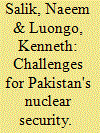

|
|
|
| 7 |
ID:
103847
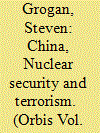

|
|
|
|
|
| Publication |
2009.
|
| Summary/Abstract |
This article outlines Chinese strategic nuclear forces and the Chinese philosophical approach to nuclear security. It then focuses on the domestic conditions in China which could precipitate vulnerabilities to its nuclear forces. From information about internal security conditions in China, specific internal threats to Chinese nuclear security will be derived. Based on these threats, several outsider and insider scenarios will be outlined involving a variety of terrorist or terrorist related behaviors. These notional scenarios will include everything from overrun or attack, to diversion, to cyber terrorism, to sabotage. The article will then cover what these scenarios and the possible Chinese reaction to them may mean for the security, military and diplomatic strategies of the United States
|
|
|
|
|
|
|
|
|
|
|
|
|
|
|
|
| 8 |
ID:
107349
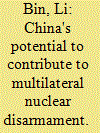

|
|
|
| 9 |
ID:
051872
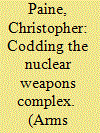

|
|
|
| 10 |
ID:
166864
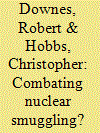

|
|
|
|
|
| Summary/Abstract |
International concern over nuclear terrorism has grown during the past few decades. This has driven a broad spectrum of efforts to strengthen nuclear security globally, including the widespread adoption of radiation-detection technology for border monitoring. Detection systems are now deployed at strategic locations for the purported purpose of detecting and deterring the smuggling of nuclear and radioactive materials. However, despite considerable investment in this area, few studies have examined how these programs are implemented or the operational challenges they face on a day-to-day basis. This article seeks to address this with a focus on radiation-detection efforts at maritime facilities. Utilizing practitioner interviews and a survey, this article identifies the factors that influence the planning and use of these systems in this fast-moving environment. The results clearly demonstrate that the implementation of these systems varies significantly across different national and organizational contexts, resulting in a fragmented global nuclear-detection architecture, which arguably undermines efforts to detect trafficked nuclear-threat materials. Greater consideration should therefore be given to developing international standards and guidance, designing and adopting tools to support key parts of the alarm assessment process, and broader sharing of good practice.
|
|
|
|
|
|
|
|
|
|
|
|
|
|
|
|
| 11 |
ID:
127633
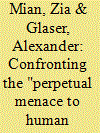

|
|
|
|
|
| Publication |
2014.
|
| Summary/Abstract |
Nuclear weapon states historically have attached great secrecy to their nuclear weapon and fissile material production programs and stockpiles, despite warnings that this would fuel fears, handicap informed debate and decision making, and drive arms races. As evidenced by the "Action Plan on Nuclear Disarmament" agreed upon at the 2010 Treaty on the Non-Proliferation of Nuclear Weapons (NPT) Review Conference, however, the international community now sees greater transparency about nuclear weapon and fissile material stocks as necessary for enabling and monitoring progress toward nuclear disarmament. To support this effort, the International Panel on Fissile Materials has proposed a step-by-step program for weapon states to declare their inventories, production histories, and disposition of nuclear warheads and fissile materials, and to set up joint projects to develop methods for verifying these declarations. This openness initiative is described here, and could be adopted at the 2015 NPT Review Conference, laying a basis for negotiating verifiable deep reductions in nuclear arsenals and their eventual elimination.
|
|
|
|
|
|
|
|
|
|
|
|
|
|
|
|
| 12 |
ID:
139044
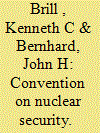

|
|
|
|
|
| Summary/Abstract |
In his 2009 speech in Prague, President Barack Obama declared, “[W]e must ensure that terrorists never acquire a nuclear weapon. This is the most immediate and extreme threat to global security.” To help deal with this threat, he said the world needed “durable institutions” devoted to the problem and announced that the United States would host a global summit on nuclear security in part to address that issue
|
|
|
|
|
|
|
|
|
|
|
|
|
|
|
|
| 13 |
ID:
146737
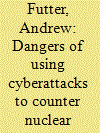

|
|
|
|
|
| Contents |
Top military and defense officials in the United States are currently contemplating plans to use cyberattack capabilities against enemy missile and command-and-control systems as part of a new push for full-spectrum missle defense.
|
|
|
|
|
|
|
|
|
|
|
|
|
|
|
|
| 14 |
ID:
144656
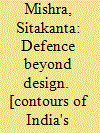

|
|
|
|
|
| Publication |
New Delhi, KW Publishers Pvt Ltd, 2016.
|
| Description |
xix, 307p.hbk
|
| Standard Number |
9789383649884
|
|
|
|
|
|
|
|
|
|
|
|
Copies: C:1/I:0,R:0,Q:0
Circulation
| Accession# | Call# | Current Location | Status | Policy | Location |
| 058636 | 355.8251190954/MIS 058636 | Main | On Shelf | General | |
|
|
|
|
| 15 |
ID:
144747
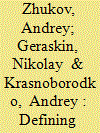

|
|
|
|
|
| Summary/Abstract |
The article is devoted to problems of defining quantitative criteria for the physical protection system (PPS) effectiveness of nuclear facilities. The article briefly describes the scheme of the PPS development used in the nuclear industry in Russia, gives a review of existing approaches to defining the minimal acceptable value of the system's effectiveness, and reveals advantages and disadvantages of the approaches. The article describes in detail an approach based on facility categorization by potential losses and a technique of defining the minimal acceptable value of the PPS effectiveness developed on its base.
|
|
|
|
|
|
|
|
|
|
|
|
|
|
|
|
| 16 |
ID:
184776
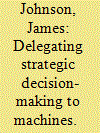

|
|
|
|
|
| Summary/Abstract |
Will the use of artificial intelligence (AI) in strategic decision-making be stabilizing or destabilizing? What are the risks and trade-offs of pre-delegating military force to machines? How might non-nuclear state and non-state actors leverage AI to put pressure on nuclear states? This article analyzes the impact of strategic stability of the use of AI in the strategic decision-making process, in particular, the risks and trade-offs of pre-delegating military force (or automating escalation) to machines. It argues that AI-enabled decision support tools - by substituting the role of human critical thinking, empathy, creativity, and intuition in the strategic decision-making process - will be fundamentally destabilizing if defense planners come to view AI’s ‘support’ function as a panacea for the cognitive fallibilities of human analysis and decision-making. The article also considers the nefarious use of AIenhanced fake news, deepfakes, bots, and other forms of social media by non-state actors and state proxy actors, which might cause states to exaggerate a threat from ambiguous or manipulated information, increasing instability.
|
|
|
|
|
|
|
|
|
|
|
|
|
|
|
|
| 17 |
ID:
147676
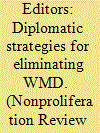

|
|
|
|
|
| Summary/Abstract |
The involvement of multiple parties makes diplomacy indispensable to the elimination of nuclear, chemical, biological and other unconventional weapons and related materials. Diplomacy is required in any attempt to address the problems of indirect control of WMD, conflicting objectives between states, conflicting priorities within states, and sometimes also the need to work in non-permissive environments. Appeals to self-interest, offers of incentives, and threats of disincentives have all been used to advance multinational efforts to manage or dispose of WMD, including elimination work.
|
|
|
|
|
|
|
|
|
|
|
|
|
|
|
|
| 18 |
ID:
137228
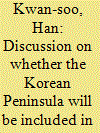

|
|
|
|
|
| Summary/Abstract |
This study aims to discuss whether the Korean Peninsula is included among the core interests claimed by China. The core interests of China are those interests that it is unwilling to negotiate over, and interests that they will even use military power to protect. China’s official core interests have so far been limited to Taiwan, Tibet and Xinjiang, but their list of core interests has been expanding in scope
since the Diaoyu/Senkaku Islands dispute. Furthermore, including the Korean Peninsula among China’s core interests leads to an immense ripple-effect on not only South Korea but also the security of Northeast Asia and U.S.-China relations. This study analyzes the following research questions: What are the core interests of China? Is the Korean Peninsula included in China’s core interests? Will the Korean Peninsula only be included in China’s core interests in the event of an emergency? If it is included, what is the specific object or likely scenario? This study conducts an in-depth analysis of the questions above and provides policy implications for the South Korean government.
|
|
|
|
|
|
|
|
|
|
|
|
|
|
|
|
| 19 |
ID:
109809
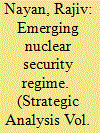

|
|
|
|
|
| Publication |
2012.
|
| Summary/Abstract |
Several measures are being initiated by the international community to secure sensitive materials. Al Qaeda's open interest in acquiring nuclear weapons and the rise of terrorist activity in nuclear-armed Pakistan have triggered a global interest in the need to secure nuclear weapons and materials. In April 2010 President Obama invited some key countries and international organisations in Washington to frame a new regime for nuclear security. The emerging regime includes some older initiatives as well as some new mechanisms, and it must address a number of issues. These range from defining nuclear security threats to finding the right kind of institution promoting nuclear security. The enthusiasm for the 2012 Nuclear Security Summit will depend on how the participating countries and the international community deal with these challenges.
|
|
|
|
|
|
|
|
|
|
|
|
|
|
|
|
| 20 |
ID:
176673


|
|
|
|
|
| Summary/Abstract |
Historically, the U.S. has sought to use commercial trade in nuclear technologies to influence international nuclear security standards and promote nonproliferation. Concern has grown that, with a stagnating domestic nuclear industry and declining export industry, the U.S. will lose a significant tool of foreign policy and leverage in maintaining strong international standards. While the issue has been discussed extensively in the policy community and used as a powerful rhetorical tool to motivate tangentially related policies such as subsidizing existing U.S. nuclear plants, no one has systematically assessed the issue, structured the problem and proposed and evaluated potential solutions. Here we briefly analyze the current international state of play, and then outline a set of specific strategies the U.S. might adopt on its own, or promote internationally, to retain its influence. Building on the literature, nuclear security and nuclear power experts assisted us in framing the issues and then, in a participatory workshop, helped us to assess and refine possible strategies. While not all experts agreed that U.S. influence has already declined, most indicated that it likely would decline in the future if present domestic and international trends continue. Although none of the proposed strategies that we advanced or that the experts suggested are likely to be effective in the short term, several warrant ongoing refinements and, if they can be implemented, might have beneficial impacts in coming decades.
|
|
|
|
|
|
|
|
|
|
|
|
|
|
|
|
|
|
|
|
|